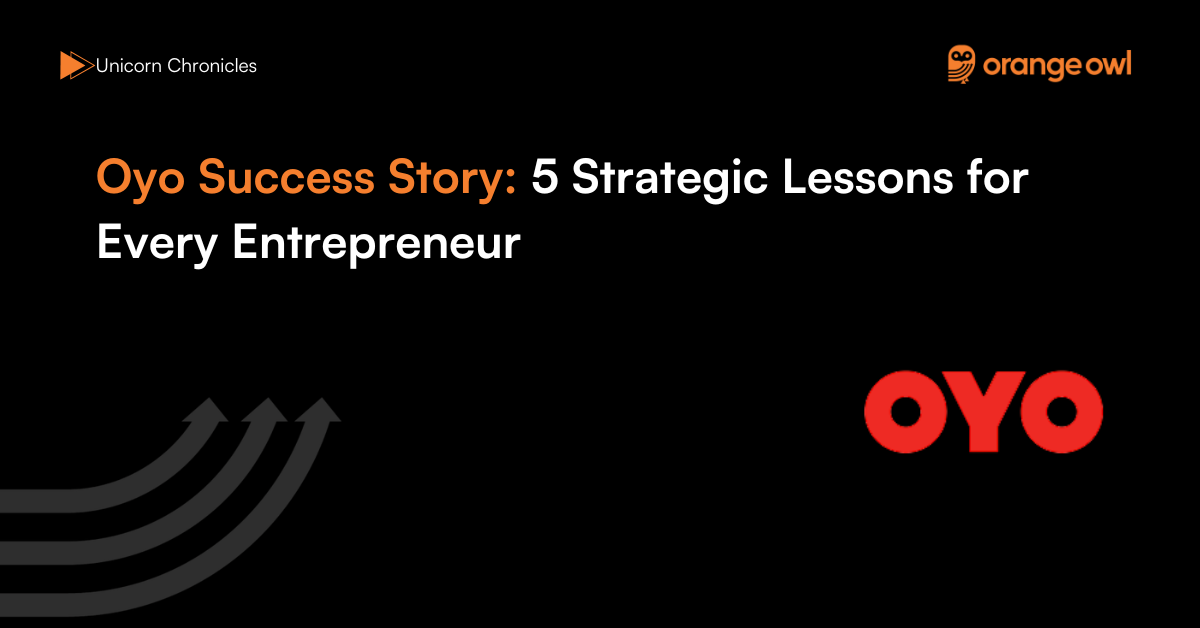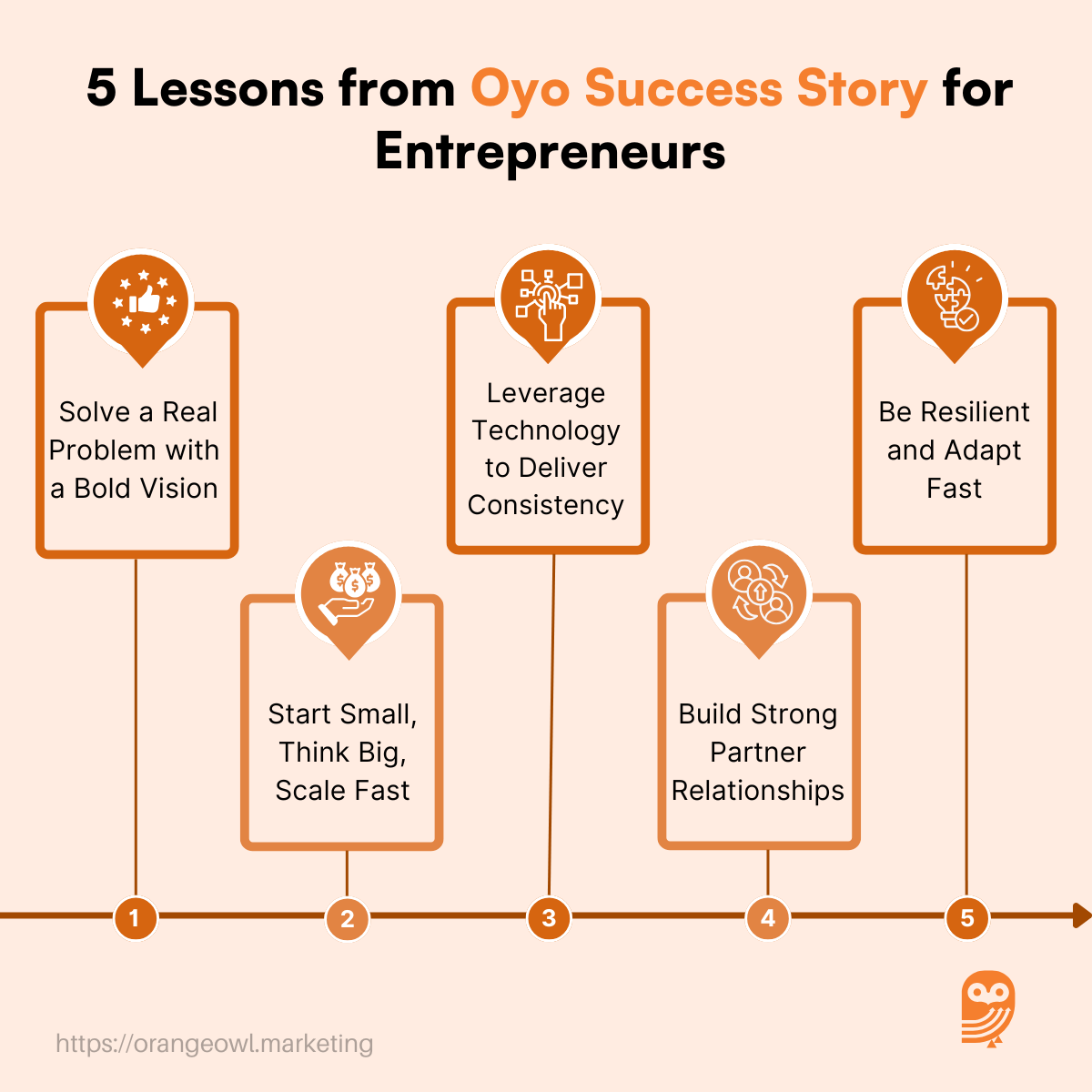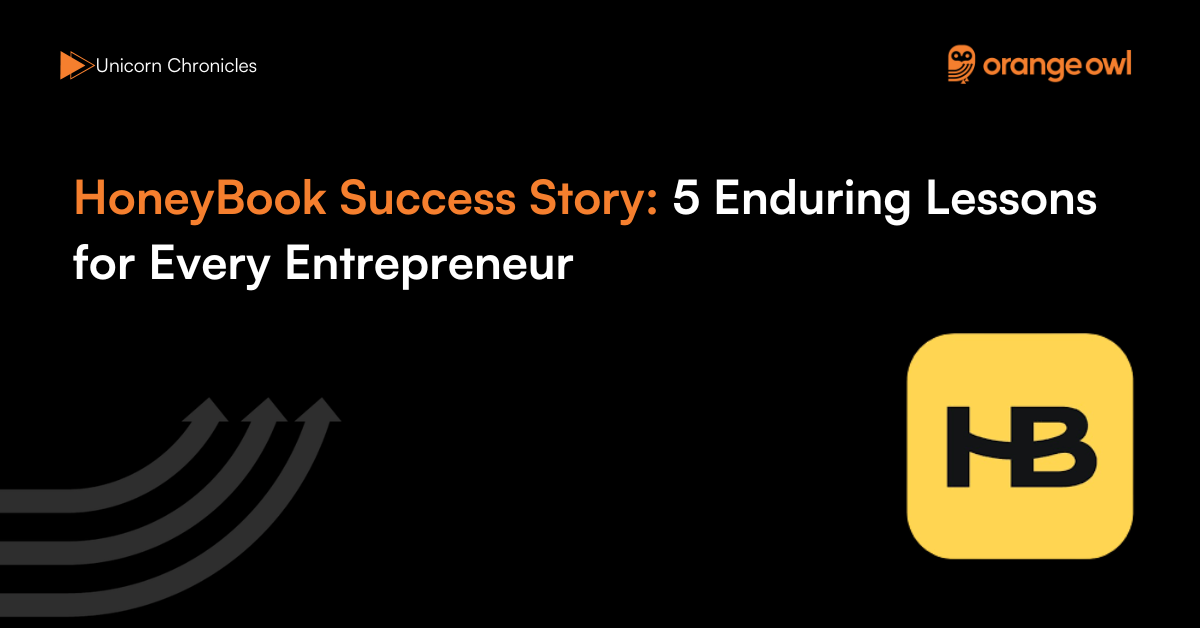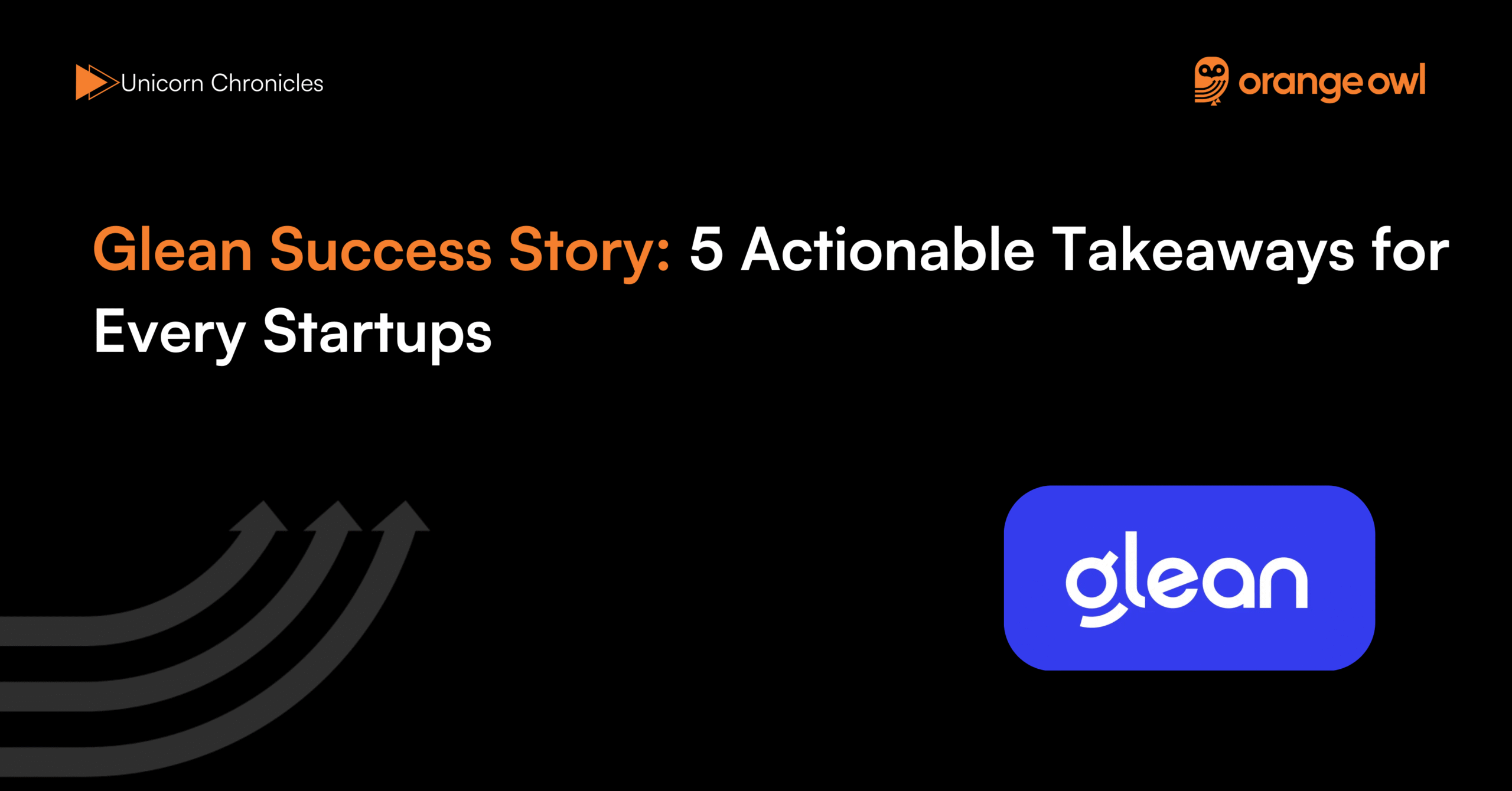Oyo Success Story: 5 Strategic Lessons for Every Entrepreneur
Vivek Goel
June 8, 2025

Table of Contents
Introduction
In the dynamic landscape of India’s digital economy, Oyo has emerged as a disruptive force in the budget hospitality sector. Founded in 2013 by serial entrepreneur Ritesh Agarwal, Oyo was created to address the fragmented and inconsistent quality in the unorganised hotel industry. By leveraging technology, standardised processes, and an asset-light model, Oyo aimed to revolutionise affordable accommodations across India and beyond.
Oyo’s innovative business model quickly gained momentum. By 2023, the company had raised multiple funding rounds, with the latest $100–$125 million infusion valuing it at around $2.5 billion, reaffirming its position as one of India’s most valuable hospitality unicorns.
The company’s scale is reflected in its presence across more than 80 countries, managing over 43,000 hotels and 1 million rooms globally. Oyo’s tech-enabled platform streamlines hotel operations and enhances guest experiences, making budget travel more accessible and reliable.
Despite facing challenges including valuation corrections and IPO delays, Oyo continues to focus on operational efficiency, market expansion, and innovative offerings to sustain its growth trajectory.
Oyo’s journey highlights how technology-driven solutions can transform traditional industries, bringing scalability, standardisation, and convenience to millions of travellers worldwide.
Origin Story
The inception of Oyo is not just a tale of business innovation but one of youthful ambition and bold disruption. Ritesh Agarwal, a young entrepreneur from Odisha, started his journey by recognising the chaos and lack of standardisation in India’s budget hotel industry. Before Oyo, budget travellers faced unpredictable quality, inconsistent pricing, and unreliable service, which often made affordable travel stressful.
At just 19 years old, Ritesh left college to pursue his vision full-time after winning the prestigious Thiel Fellowship in 2014, which provided him the confidence and resources to build a scalable solution. He was driven by the idea that technology could bring transparency, trust, and convenience to a highly fragmented hospitality market.
“I wanted to solve a problem that affects millions of people every day – the struggle to find clean, affordable, and reliable accommodation.” – Ritesh Agarwal
Starting with a handful of properties in Gurgaon, Oyo set out to standardise budget stays by partnering with hotels, improving quality, and offering customers a predictable experience. What began as a modest startup with a asset-light approach soon grew exponentially, fueled by aggressive technology adoption and a vision to democratize hospitality not only in India but globally.
“The hotel industry was unorganised and lacked trust. I realised that technology could help us change that.” – Ritesh Agarwal
This is the Oyo success story — a journey of transforming the unorganised budget hotel sector into a trusted, tech-enabled hospitality brand.
Business Space and Early Challenges
Oyo entered the highly fragmented and unorganised budget hotel market in India—a space dominated by small hotel owners, inconsistent service quality, and a lack of standardised pricing. Unlike traditional hotel chains, Oyo positioned itself as a technology-driven platform that could bring transparency, standardisation, and reliability to budget stays across the country.
However, this sector posed unique challenges. Many hotel owners were sceptical of a new model that asked them to conform to standards and share revenue, while customers were wary of booking unfamiliar hotels online without prior assurance of quality. The challenge was to build trust on both sides—hotels and travellers.
“In India, budget hotel stays were unpredictable and often disappointing. Convincing customers to book without seeing the property was a huge challenge.” – Ritesh Agarwal
To tackle these issues, Oyo developed strict quality control protocols and implemented standard operating procedures for its partner hotels. Using technology, Oyo enabled customers to browse verified listings, access uniform amenities, and experience consistent service regardless of location. The asset-light model allowed rapid scaling while ensuring brand standards.
“For any startup, building trust is the toughest yet most important challenge. We focused relentlessly on user experience to win that trust.” – Ritesh Agarwal
Despite initial resistance from hotel owners and cautious customers, Oyo’s technology-first approach and customer-centric policies gradually transformed the budget hospitality landscape, laying the foundation for Oyo to become one of India’s fastest-growing hospitality unicorns.
Growth Strategies
A mix of technology innovation, aggressive scaling, and a sharp focus on customer experience drove Oyo’s rapid rise in the budget hospitality sector. Central to Oyo’s growth was its ability to standardise fragmented hotel inventory through a robust tech platform, ensuring quality and consistency across thousands of partner properties.
From early on, Oyo focused on building trust by leveraging technology to offer real-time booking, transparent pricing, and verified listings, addressing the biggest pain points for travellers in India’s unorganised hotel market. The company also invested heavily in data analytics and machine learning to optimise pricing, demand forecasting, and supply management.
“We knew that scaling fast was essential, but maintaining service quality was non-negotiable.” – Ritesh Agarwal
Oyo expanded aggressively across tier-2 and tier-3 cities, tapping into underserved markets where organised hospitality options were limited. This approach unlocked a vast customer base seeking affordable and reliable stays beyond metros. The asset-light franchise model enabled Oyo to rapidly onboard hotels without incurring heavy capital expenditures, fueling exponential growth.
Beyond India, Oyo pursued international expansion into markets like China, Southeast Asia, Europe, and the US, adapting its model to diverse local contexts. This global footprint demonstrated Oyo’s ambition to become a leading hospitality brand worldwide.
Additionally, Oyo diversified its offerings by launching Oyo Townhouse (midscale hotels), Oyo Home (vacation rentals), and other verticals, broadening its customer appeal and revenue streams.
By combining technology, aggressive market penetration, and a customer-first approach, Oyo transformed the budget hotel landscape and established itself as a dominant player in the global hospitality sector.
Marketing Strategies
Oyo’s marketing approach was pivotal in transforming the fragmented budget hospitality space into a recognised and trusted brand. At a time when budget hotels were often associated with poor quality and unpredictability, Oyo focused on building trust through consistency and transparency.
The brand launched campaigns centred around affordability, convenience, and reliability, such as “Stay Smart, Stay With Oyo”, which resonated deeply with young travellers and budget-conscious customers. These campaigns demystified budget accommodations and positioned Oyo as a modern, tech-enabled alternative to traditional hotels.
“Branding is not just about logos; it’s about building trust and emotional connection with customers.” – Ritesh Agarwal
Oyo leveraged digital-first marketing channels extensively, including search engine marketing, social media platforms, and influencer partnerships, to reach a millennial and Gen Z audience who were comfortable booking stays via apps. The company also used data-driven personalisation to deliver targeted offers and promotions, increasing customer engagement and loyalty.
In addition to consumer marketing, Oyo invested in partner engagement programs to onboard and train hotel owners, ensuring service standards were maintained. This dual focus helped Oyo scale rapidly while protecting brand reputation.
The brand also innovated with experiential marketing, offering users virtual tours, user-generated reviews, and loyalty programs, which enhanced customer confidence and repeat bookings.
By combining strong brand messaging, educational content, and digital savvy, Oyo succeeded in not just attracting customers but also reshaping perceptions around budget stays, fueling its journey to becoming a global hospitality unicorn
5 Strategic Lessons for Every Entrepreneur
1. Solve a Real Problem with a Bold Vision
Oyo didn’t just aim to be another hotel aggregator—it set out to solve the fragmented and unreliable budget hotel market in India. Ritesh Agarwal saw millions of travellers struggling to find affordable, quality stays with standardised service. His conviction to bring transparency and consistency became Oyo’s guiding force.
“Don’t just create a product, solve a problem that affects millions deeply.” – Ritesh Agarwal
The lesson: entrepreneurs must identify real pain points and commit to solving them at scale with a clear focus and bold vision.
2. Start Small, Think Big, Scale Fast
Ritesh began Oyo as a modest startup, initially partnering with a handful of budget hotels to standardise their services. But his ambition was global from the start. By relentlessly improving operational efficiency and leveraging technology, Oyo scaled rapidly across cities and countries.
“Start with what you can control, but never lose sight of the big picture.” – Ritesh Agarwal
This teaches founders to combine careful piloting with aggressive scaling to capture market leadership.

3. Leverage Technology to Deliver Consistency
In hospitality, guest experience can vary widely. Oyo’s edge came from using technology to ensure uniform quality standards, real-time pricing, and seamless booking experiences. This built trust among customers who were sceptical of budget hotels.
“Technology is not just a tool, it’s the backbone of scalable trust.” – Ritesh Agarwal
The takeaway: technology-driven operational rigour can transform fragmented industries and build reliable brands.
4. Build Strong Partner Relationships
Oyo’s success wasn’t just consumer-focused—it depended heavily on winning over hotel owners. Through training, onboarding programs, and revenue-sharing models, Oyo created win-win partnerships that motivated owners to improve service and scale inventory.
“We grow only when our partners grow. That’s the foundation of sustainable success.” – Ritesh Agarwal
Founders should remember that nurturing their ecosystem stakeholders can create lasting competitive advantages.
5. Be Resilient and Adapt Fast
Oyo faced many challenges, from regulatory hurdles to operational setbacks and global disruptions like the pandemic. But its leadership’s resilience and willingness to adapt — pivoting business models and optimising costs — helped it survive and thrive.
“Resilience is not just enduring adversity, but learning and evolving from it.” – Ritesh Agarwal
The lesson for entrepreneurs: Agility and grit are essential to navigate uncertainty and emerge stronger.
Conclusion
Oyo’s journey is far more than just a hotel startup success story—it’s a powerful example of how vision, technology, and relentless execution can transform a fragmented industry and redefine customer experiences worldwide. In a market once characterised by inconsistency and distrust, Oyo pioneered a new standard of affordable, reliable, and scalable hospitality.
From a young entrepreneur’s bold idea to a global hospitality unicorn, Ritesh Agarwal’s story is filled with lessons of ambition, resilience, and innovation. Oyo’s rise shows that with the right blend of technology, partnerships, and a customer-first mindset, even entrenched industries can be disrupted.
“Success is not about avoiding failure; it’s about learning fast, adapting, and staying focused on your mission.” – Ritesh Agarwal
For entrepreneurs and founders, the Oyo success story stands as a beacon, encouraging you to think big, act fast, and never lose sight of the real problem you are solving. Whether you’re building your first product or scaling across continents, Oyo’s journey is a testament to the power of resilience, technology, and authentic leadership.


